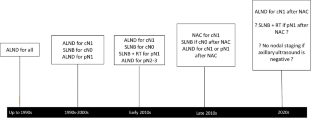乳腺癌腋窝结节分期:我们学到了什么?
IF 4.2
3区 医学
Q2 ONCOLOGY
引用次数: 0
摘要
乳腺癌患者的腋窝治疗一直在不断发展变化。为了提供适当的治疗建议,我们必须了解结节分期的历史意义和当前适应症,以及结节转移的临床意义。随着我们逐渐放弃以前作为乳腺癌治疗主流的最大腋窝手术干预,未来的研究工作将侧重于基于肿瘤生物学的靶向治疗,以及确定肿瘤学上安全的方法来降低我们的治疗策略。本文章由计算机程序翻译,如有差异,请以英文原文为准。

Axillary nodal staging in breast cancer: what have we learned?
Axillary management in patients with breast cancer is in a constant state of evolution. To provide appropriate treatment recommendations, we must understand the historical implications and the current indications for nodal staging as well as the clinical implications of nodal metastases. As we move away from maximal axillary surgical intervention that was previously the mainstay of breast cancer management, future research efforts will focus on targeted therapies based on tumor biology and identifying oncologically safe methods to de-escalate our management strategies.
求助全文
通过发布文献求助,成功后即可免费获取论文全文。
去求助
来源期刊
CiteScore
7.80
自引率
5.00%
发文量
55
审稿时长
12 months
期刊介绍:
The Journal''s scope encompasses all aspects of metastasis research, whether laboratory-based, experimental or clinical and therapeutic. It covers such areas as molecular biology, pharmacology, tumor biology, and clinical cancer treatment (with all its subdivisions of surgery, chemotherapy and radio-therapy as well as pathology and epidemiology) insofar as these disciplines are concerned with the Journal''s core subject of metastasis formation, prevention and treatment.

 求助内容:
求助内容: 应助结果提醒方式:
应助结果提醒方式:


